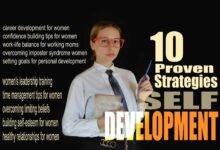Financial Stability for Women in 2024: Crush the Ceiling & Break Through Barriers

Feeling the itch to switch gears? But wondering how to land on your feet financially?
Career transitions are exciting, but let’s be honest, they can also be nerve-wracking. You’re chasing a dream, exploring new possibilities, but the question of “how am I going to make this work?” lingers. Especially when it comes to our wallets.
Fear not, fellow career adventurers! This blog is your friendly guide to navigating financial stability for women during those exciting career shifts. We’ll tackle everything from budgeting strategies to negotiating your new salary, all with a supportive and empowering approach.
Think of it as your financial compass, pointing you towards the secure and fulfilling future you deserve. So, grab your coffee (or tea!), buckle up, and let’s get this journey started!
Table of Contents
Negotiating Salary and Benefits as a Woman
Research-Driven Negotiation:
For example, websites like PayScale and Glassdoor offer salary data and negotiation tips specific to different industries and locations, empowering women to negotiate from an informed position.
Overcoming Challenges:
Drawing inspiration from successful negotiators like Oprah Winfrey, who negotiated lucrative deals for her own media empire, women can overcome negotiation challenges with confidence and assertiveness.
Celebrating Success Stories:
Websites like The Muse and Career Contessa feature success stories of women who successfully negotiated their salaries and benefits, providing actionable insights and inspiration for others.
Maximizing Compensation Package with Effective Negotiation
Identifying Priorities:
Resources such as the Women’s Bureau of the U.S. Department of Labor offer guidance on understanding and prioritizing benefits beyond salary, ensuring women negotiate for what matters most to them.
Role of Mentorship:
Platforms like LinkedIn and professional networking groups provide opportunities for women to connect with mentors and negotiation coaches who can offer personalized guidance and support.
Remote Work Considerations:
Websites like FlexJobs and Remote.co curate remote job listings with comprehensive benefits packages, empowering women to negotiate for remote work options that align with their financial and lifestyle needs.
Securing the Benefits You Deserve in Your Job Offer
Navigating Parental Leave:
Organizations like Working Mother provide resources and guides on navigating parental leave policies and negotiating family-friendly benefits, helping women advocate for their needs during career transitions.
Equity and Ownership Negotiation:
For women considering entrepreneurship or startups, resources like the Small Business Administration (SBA) and Women’s Business Centers offer guidance on negotiating equity and ownership stakes in new ventures.
Financial Literacy for Benefits:
Websites like Investopedia and NerdWallet offer comprehensive guides on understanding employee benefits and retirement plans, equipping women with financial literacy skills to make informed decisions.
Building Your Leverage and Advocating for Your Worth
Building Positive Relationships:
Platforms like Ellevate Network and Lean In Circles provide spaces for women to connect with like-minded professionals and build supportive networks, enhancing their negotiating power and confidence.
Navigating Emotions:
Books like “Women Don’t Ask” by Linda Babcock and Sara Laschever offer insights into overcoming emotional barriers in negotiations, empowering women to navigate difficult conversations with composure and resilience.
Utilizing Alternative Tactics:
Websites like The Everygirl and BossBabe offer resources on creative negotiation tactics beyond salary, such as negotiating for flexible work arrangements and professional development opportunities.
Mastering the Art of Asking for More During Salary Negotiations
Effective Communication Skills:
Online courses like those offered by Coursera and Udemy on communication and negotiation skills provide women with practical strategies for articulating their value and negotiating confidently.
Data-Driven Arguments:
Publications like Harvard Business Review and Forbes feature articles on leveraging data and research in negotiations, equipping women with evidence-based arguments to support their salary and benefits requests.
Strategic Use of Silence:
Podcasts like “Women at Work” from Harvard Business Review offer insights into mastering the strategic use of silence in negotiations, helping women navigate negotiations with poise and strategic acumen.
Understanding Key Benefits and Negotiating for What Matters Most
Holistic Approach to Benefits:
Financial planning platforms like Mint and Personal Capital offer tools for women to assess their financial needs and prioritize benefits like retirement savings, healthcare, and paid time off during negotiations.
Tailoring Benefits to Your Needs:
Websites like The Balance and CareerBuilder provide customizable templates for crafting counteroffers that address women’s unique financial priorities and lifestyle preferences.
Effective Use of Technology:
Apps like Salary Fairy and FairyGodBoss offer salary comparison tools and negotiation resources specifically tailored to women, empowering them to leverage technology in their negotiation strategies.
Navigating Salary Negotiations During Promotions and Career Transitions
Strategies for Career Advancement:
Professional development platforms like LinkedIn Learning and Skillshare offer courses on advancing careers and negotiating promotions, providing women with actionable strategies for navigating upward mobility.
Adapting to Change:
Career transition services like The Muse and Indeed Career Guide offer resources on adapting negotiation strategies to different career stages and industries, helping women navigate transitions with confidence.
Utilizing Career Coaches:
Certified career coaches and negotiation experts like Negotiation Unleashed and Career Contessa offer personalized coaching and support to women navigating complex negotiation situations, ensuring they maximize their potential.
Leveraging Research and Data to Support Your Negotiation Arguments
Data-Driven Negotiation:
Research institutions like the Institute for Women’s Policy Research (IWPR) and Catalyst offer data and reports on pay equity and workplace trends, equipping women with evidence to support their negotiation arguments.
Networking for Data Insights:
Professional associations like the National Association of Women MBAs (NAWMBA) and Women in Technology International (WITI) provide access to industry-specific data and networking opportunities, empowering women to leverage data insights in negotiations.
Enhancing Negotiation Skills:
Negotiation workshops and seminars offered by organizations like The Negotiation Institute and American Negotiation Institute provide immersive learning experiences for women to hone their negotiation skills and build confidence.

Developing Powerful Communication Skills for Successful Negotiation
Active Listening in Negotiation:
Podcasts like “Negotiate Anything” with Kwame Christian offer insights into active listening techniques and communication strategies for women to engage effectively in negotiations and build rapport with counterparts.
Building Rapport with Employers:
Resources like “Crucial Conversations” by Kerry Patterson and “Never Split the Difference” by Chris Voss offer practical tips on building rapport and trust with employers, facilitating productive negotiations and positive outcomes.
Negotiating Beyond Salary:
Online communities like Reddit’s r/personalfinance and The Financial Diet’s Facebook group provide forums for women to share experiences and insights on negotiating non-monetary benefits like flexible work arrangements and professional development opportunities.
Building Positive Relationships with Employers for Strong Negotiation Outcomes
Creating Lasting Impressions:
Webinars and seminars hosted by professional organizations like Women in Leadership (WIL) and The National Association for Female Executives (NAFE) offer opportunities for women to network and build relationships with employers, enhancing their negotiation success.
Navigating Difficult Conversations:
Articles and case studies from organizations like the American Management Association (AMA) and Harvard Business School’s Working Knowledge provide insights into navigating difficult conversations and resolving conflicts constructively, empowering women to negotiate with confidence.
Celebrating Success and Inspiring Others:
Women’s leadership conferences and events like the Women in the World Summit and Women Empower Expo provide platforms for successful women to share their negotiation stories and inspire others to advocate for their worth, fostering a culture of empowerment and financial success.
Managing Emotions and Navigating Difficult Conversations Strategically
Emotional Intelligence in Negotiation:
Emotional intelligence assessments like those offered by EQ-i 2.0 and Emotional Intelligence 2.0 by Travis Bradberry provide insights into managing emotions effectively and staying composed during negotiations, empowering women to navigate difficult conversations with confidence.
Conflict Resolution Strategies:
Books like “Difficult Conversations” by Douglas Stone and “Crucial Accountability” by Kerry Patterson offer practical strategies for resolving conflicts and managing difficult conversations, equipping women with the skills to navigate negotiation challenges successfully.
Empowering Mindset:
Online communities like TED Talks and FemCity provide inspirational talks and stories of resilience, encouraging women to adopt an empowering mindset and approach negotiations with optimism and determination.
Celebrating Successes and Inspiring Other Women to Negotiate Their Benefits
Sharing Success Stories:
Online platforms like LinkedIn and Medium provide spaces for women to share their negotiation successes and lessons learned, inspiring others to advocate for their worth and negotiate their benefits confidently.
Mentoring and Coaching to get Financial Stability for Women:
Mentorship programs like Women in Technology International (WITI) and The National Association of Women Business Owners (NAWBO) offer opportunities for experienced professionals to mentor and coach women in negotiation skills, empowering them to achieve their career goals.
Collaborative Learning for Financial Stability for Women:
Women’s leadership networks and forums like Ellevate Network and The Riveter provide opportunities for collaborative learning and skill-building through workshops, seminars, and peer-to-peer support, fostering a community of empowered negotiators.
Financial Stability for Women: Advocating for Equal Pay
Legislation and Policy Advocacy:
Organizations like the American Association of University Women (AAUW) and Equal Rights Advocates (ERA) advocate for legislative reforms and policies to address pay equity issues, empowering women to pursue financially stable career paths with fair compensation.
Corporate Accountability:
Publications like Forbes and Fortune track and report on corporate diversity and inclusion initiatives, holding companies accountable for their commitment to pay equity and creating opportunities for women to access financially stable career paths.
Transparent Compensation Practices:
Websites like Salary.com and PayScale provide resources for women to research and compare salaries across industries and job roles, promoting transparency and accountability in compensation practices and empowering women to make informed career decisions.
Highest Paying Jobs for Women with Benefits: Negotiating Salary for Women in 2024
Industry-Specific Insights:
Industry reports and publications like the Bureau of Labor Statistics (BLS) and industry trade journals provide insights into salary trends and negotiation strategies specific to high-paying sectors like technology, finance, and healthcare.
Professional Development Opportunities:
Professional associations like the National Association of Female Executives (NAFE) and the Society for Human Resource Management (SHRM) offer resources and networking opportunities for women to advance their careers and negotiate competitive salaries with comprehensive benefits packages.
Executive Compensation Analysis:
Consulting firms like Mercer and Deloitte offer executive compensation analysis and benchmarking services, providing insights into salary and benefits trends for women in leadership roles and empowering them to negotiate equitable compensation packages.
Building Wealth as a Woman Professional: Investing for Financial Security for Women
Investment Education and Resources:
Financial planning platforms like Vanguard and Fidelity offer investment education resources and tools for women to build wealth and achieve financial security through strategic investment strategies tailored to their goals and risk tolerance.
Robo-Advisors and Automated Investing:
Robo-advisor platforms like Betterment and Wealthfront offer automated investment solutions for women to build wealth passively and achieve long-term financial goals with minimal effort and expertise required.
Real Estate and Property Investment:
Real estate investment platforms like Fundrise and Roofstock offer opportunities for women to invest in real estate and generate passive income streams, diversifying their investment portfolios and building wealth over time.
Managing Student Loans for Career Success
Student Loan Refinancing Options:
Financial institutions like SoFi and Earnest offer student loan refinancing options for women to lower their interest rates and monthly payments, reducing financial strain and freeing up funds for career advancement and savings.
Income-Driven Repayment Plans:
Federal student loan servicers like Navient and Nelnet offer income-driven repayment plans for women struggling to manage student loan debt, providing flexible payment options based on their income and financial circumstances.
Loan Forgiveness Programs:
Public service organizations like Teach For America and AmeriCorps offer loan forgiveness programs for women working in eligible fields and industries, incentivizing public service and supporting career development without the burden of student loan debt.
Financial Planning for Single Mothers
Child Support and Alimony:
Legal resources like LegalZoom and FindLaw offer guidance on child support and alimony laws and rights for single mothers, ensuring financial stability and support for themselves and their children during and after divorce or separation.
Government Assistance Programs:
Social services agencies like the Department of Health and Human Services (HHS) and state welfare offices offer assistance programs like Temporary Assistance for Needy Families (TANF) and Women, Infants, and Children (WIC) for single mothers in need of financial support and resources.
Community Support Networks:
Nonprofit organizations like Single Parent Advocate and Single Mom Coalition offer community support networks and resources for single mothers, providing emotional support, financial assistance, and networking opportunities for mutual aid and empowerment.
Remote Jobs with Benefits for Financial Independence
Remote Work Platforms:
Remote job platforms like FlexJobs and Remote.co curate job listings with remote work options and comprehensive benefits packages, enabling women to pursue flexible employment opportunities without sacrificing financial security or career advancement.
Freelance and Gig Economy:
Freelance platforms like Upwork and Fiverr offer opportunities for women to work independently and earn income on their own terms, providing flexibility, autonomy, and financial independence through remote work and project-based engagements.
Virtual Assistant and Customer Service Jobs:
Virtual assistant companies like Belay and Boldly offer remote job opportunities for women to provide administrative and customer support services from home, earning competitive wages and benefits while balancing work-life priorities.
Entrepreneurial Ventures for Women
Small Business Resources:
Government agencies like the Small Business Administration (SBA) and SCORE offer resources and support for women entrepreneurs to start and grow their own businesses, providing guidance on business planning, funding, and marketing strategies for success.
Startup Accelerators and Incubators:
Startup accelerators like Y Combinator and Techstars offer programs and funding opportunities for women-led startups and entrepreneurs, providing mentorship, networking, and resources to scale their ventures and achieve financial success.
E-commerce and Online Retail:
E-commerce platforms like Shopify and Etsy offer opportunities for women to launch and grow online retail businesses, selling products and services to global audiences and generating income and wealth through entrepreneurship.
Side Hustles for Building Financial Stability
Earning Opportunities:
Gig economy platforms like TaskRabbit and Uber offer opportunities for women to earn extra income through side hustles and part-time work, providing flexibility and financial stability through supplemental earnings.
Passion Projects and Creative Ventures:
Online marketplaces like Etsy and Redbubble offer opportunities for women to monetize their creative talents and hobbies, selling handmade crafts, artwork, and digital products to customers worldwide and generating income through passion projects.
Consulting and Freelancing:
Professional services platforms like LinkedIn ProFinder and Catalant offer opportunities for women to offer their expertise and skills as consultants and freelancers, providing services like marketing, writing, and coaching to clients and businesses and earning income through flexible, project-based engagements.
Financial Literacy Resources for Women
Education and Workshops:
Financial literacy organizations like the National Endowment for Financial Education (NEFE) and Junior Achievement offer workshops and resources for women to improve their financial literacy and knowledge, providing guidance on budgeting, saving, investing, and retirement planning for long-term financial success.
Online Courses and Webinars:
Financial education platforms like Coursera and Udemy offer online courses and webinars on a wide range of financial topics, providing accessible and affordable education and resources for women to build their financial literacy and confidence at their own pace and convenience.
Community Support and Networks:
Women’s financial empowerment groups like Smart Women Smart Money and Women’s Money Circles offer community support and networking opportunities for women to connect, share experiences, and learn from one another, fostering collaboration, empowerment, and financial success.

Retirement Planning Tips for Women
Starting Early:
Financial advisors and retirement planners like Vanguard and Charles Schwab recommend starting retirement planning early and contributing regularly to retirement accounts like 401(k)s and IRAs to maximize savings and compound interest over time, providing a secure financial foundation for retirement.
Maximizing Contributions:
Employer-sponsored retirement plans like 401(k)s and 403(b)s offer opportunities for women to maximize their retirement savings by contributing the maximum allowable amount each year and taking advantage of employer matching contributions and tax benefits, accelerating wealth accumulation and retirement readiness.
Diversifying Investments:
Financial advisors and investment experts like Warren Buffett and Suze Orman recommend diversifying retirement investments across asset classes like stocks, bonds, and real estate to reduce risk and optimize returns, providing long-term growth and stability for retirement portfolios.
Overcoming Pay Gap Challenges for Women
Advocating for Equal Pay:
women‘s advocacy organizations like Equal Pay Today and Time’s Up advocate for legislative reforms and corporate policies to address pay inequities and ensure equal pay for equal work, providing resources and support for women to advocate for their rights and challenge discriminatory pay practices in the workplace.
Negotiating Fair Compensation:
Career coaches and negotiation experts like Linda Babcock and Margaret Neale offer strategies and techniques for women to negotiate fair compensation and benefits, providing tools and support for women to assertively advocate for their worth and secure competitive pay packages in negotiations.
Raising Awareness:
Media outlets and publications like The New York Times and Forbes raise awareness of pay gap challenges and disparities faced by women in the workforce, highlighting the importance of pay equity and calling for action to address systemic barriers and biases that perpetuate inequality.
Building Confidence in Salary Negotiations
Building Self-Esteem:
Personal development coaches and confidence experts like Amy Cuddy and Brené Brown offer insights and techniques for women to build self-esteem and assertiveness, providing strategies to overcome imposter syndrome and self-doubt and negotiate with confidence and conviction.
Practicing Assertiveness:
Role-playing exercises and mock negotiation scenarios offered by negotiation workshops and seminars like Getting to Yes and Crucial Conversations provide opportunities for women to practice assertiveness and communication skills, building confidence and competence in negotiations and achieving positive outcomes.
Seeking Support:
Professional mentors and sponsors like Sheryl Sandberg and Oprah Winfrey offer guidance and support for women to navigate salary negotiations and career advancement, providing encouragement and mentorship to help women overcome challenges and achieve their professional goals.
Financial Planning After a Career Break
Reassessing Financial Goals:
Financial advisors and planners like Certified Financial Planner (CFP) professionals and wealth managers recommend reassessing financial goals and priorities after a career break, adjusting savings and investment strategies to align with changing circumstances and objectives, providing a roadmap for achieving financial security and success.
Returning to Work:
Return-to-work programs and resources like The Mom Project and Path Forward offer support and guidance for women reentering the workforce after a career break, providing opportunities for skill-building, networking, and job placement to facilitate successful transitions back to work and career advancement.
Balancing Work and Family:
Work-life balance coaches and experts like Arianna Huffington and Laura Vanderkam offer strategies and tips for women to balance work and family responsibilities effectively, providing tools and techniques for managing time, energy, and priorities to achieve success and fulfillment in both professional and personal domains.
Understanding Key Financial Concepts for Long-Term Stability
Budgeting Basics:
Financial literacy websites and apps like Mint and YNAB offer budgeting tools and resources for women to track expenses, set financial goals, and manage cash flow effectively, providing a foundation for building financial stability and achieving long-term success.
Savings Strategies:
Personal finance blogs and podcasts like The Financial Diet and The Dave Ramsey Show offer savings tips and strategies for women to build emergency funds, save for short-term goals, and invest for long-term wealth accumulation, providing guidance and inspiration for achieving financial independence and security.
Debt Management:
Debt repayment calculators and tools like Credit Karma and NerdWallet offer resources for women to manage debt effectively, prioritize payments, and develop strategies for reducing debt and improving credit scores, providing a path to financial freedom and stability.
Financial Planning for Women in Transition: Investing in Your Future
Planning for Change:
Financial planning platforms and resources like Personal Capital and Wealthfront offer tools and guidance for women to plan for major life transitions like marriage, divorce, parenthood, and retirement, providing support and strategies for navigating change and achieving financial security.
Building Resilience:
Financial wellness programs and seminars like Smart About Money and Financial Peace University offer education and support for women to build resilience and cope with financial stress and uncertainty, providing tools and techniques for managing emotions and making informed decisions during times of transition.
Investing in Yourself:
Professional development courses and workshops like LinkedIn Learning and Udacity offer opportunities for women to invest in their skills and knowledge, enhancing their employability, earning potential, and career satisfaction, providing a pathway to personal and professional growth and success.
Financial Planning for Women: Navigating Uncertainty with Confidence
Creating a Financial Roadmap:
Financial planning professionals and advisors like Certified Financial Planners (CFPs) and Registered Investment Advisors (RIAs) offer personalized guidance and support for women to create financial plans
tailored to their goals, needs, and values, providing clarity, direction, and peace of mind.
Building a Support Network:
Community organizations and groups like Women’s Investment Network and Ellevest offer opportunities for women to connect, collaborate, and share resources and insights about financial planning and investing, providing encouragement, accountability, and camaraderie on the journey to financial empowerment and success.
Taking Action:
Books and resources like “The Total Money Makeover” by Dave Ramsey and “Rich Dad Poor Dad” by Robert Kiyosaki offer actionable advice and inspiration for women to take control of their finances, overcome obstacles, and achieve their dreams, providing motivation and momentum for building a brighter financial future.
Financial Empowerment for Women: Investing in Your Future
Financial Education and Resources:
Financial literacy organizations like the National Endowment for Financial Education (NEFE) and MyMoney.gov offer educational resources and tools for women to improve their financial knowledge and skills, providing a foundation for making informed decisions and achieving financial independence.
Investment Opportunities:
Investment platforms and apps like Robinhood and Acorns offer opportunities for women to start investing with low fees and minimums, providing access to a diverse range of investment options and strategies for building wealth over time.
Retirement Planning:
Retirement planning tools and calculators like Vanguard Retirement Nest Egg Calculator and Fidelity Retirement Score offer insights and projections for women to plan and prepare for retirement, providing confidence and peace of mind for the future.
Financial Planning for Women: Empowering You to Take Control of Your Financial Future
Setting Goals:
Financial goal-setting tools and resources like SMART goals and the 50/30/20 budget rule offer strategies for women to define their priorities and create a roadmap for achieving financial success, providing clarity, focus, and motivation along the way.
Taking Action:
Financial action plans and checklists like the Financial Empowerment Checklist and Financial Planning Roadmap offer step-by-step guidance for women to take control of their finances and make progress toward their goals, providing accountability and momentum for positive change.
Seeking Support:
Financial advisors and planners like Certified Financial Planners (CFPs) and fee-only advisors offer personalized guidance and support for women to navigate complex financial decisions and overcome challenges, providing expertise, perspective, and peace of mind on the journey to financial empowerment and independence.
Conclusion: Empowering Women to Achieve Financial Stability
In conclusion, navigating career transitions and building financial stability as a woman requires proactive planning, strategic negotiation, and ongoing education. By leveraging resources, advocating for their worth, and investing in their future, women can overcome challenges, seize opportunities, and achieve lasting financial success. Remember, your financial journey is unique, but you’re not alone—empower yourself, take action, and embrace the possibilities that lie ahead.
FAQs: Answering Your Burning Questions
How can I negotiate a higher salary as a woman?
Research industry standards, highlight your achievements, and practice negotiation scenarios to confidently advocate for your worth.
What are some remote job options with benefits for women?
Explore remote job platforms like FlexJobs and Remote.co for opportunities in various industries with competitive benefits packages.
How can I balance work and family as a single mother?
Seek support from community organizations, utilize government assistance programs, and prioritize self-care to manage responsibilities effectively.
What are the best investment strategies for women with low income?
Consider automated investment platforms like Betterment, explore real estate investment opportunities, and focus on building a diversified portfolio over time.
How can I overcome pay gap challenges in the workplace?
Advocate for equal pay, research salary data, and seek mentorship and support from professional networks to address pay disparities and promote fairness.
What resources are available for women returning to work after a career break?
Explore return-to-work programs like The Mom Project, leverage professional development resources, and network with industry contacts for support and guidance.
How can I improve my financial literacy as a woman?
Take advantage of online courses, attend workshops and seminars, and join financial empowerment communities to enhance your knowledge and skills.
What are the key factors to consider when planning for retirement as a woman?
Start saving early, maximize retirement account contributions, and diversify investments to ensure long-term financial security and stability.
How can I build confidence in salary negotiations and financial decision-making?
Practice assertiveness, seek mentorship and coaching, and celebrate your successes to build confidence and resilience in navigating financial challenges.
Where can I find additional support and resources for financial planning as a woman?
Explore financial planning platforms, connect with professional advisors, and join women’s empowerment networks for personalized guidance and support.










Hi there, Really impressed with this extensive knowledge on topic. Keep it up and can you write some articles dedicated to Australian Women if possible. Thanks